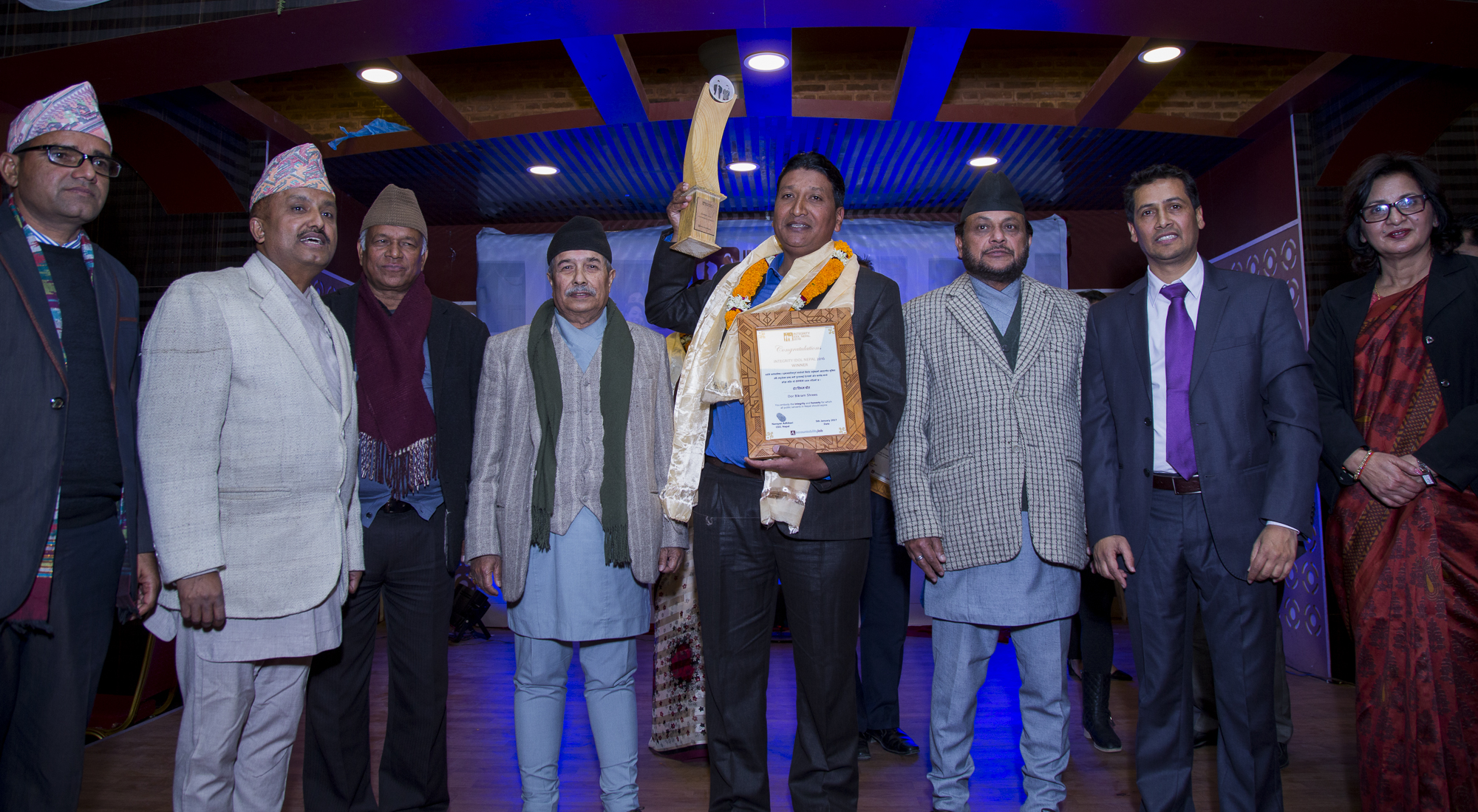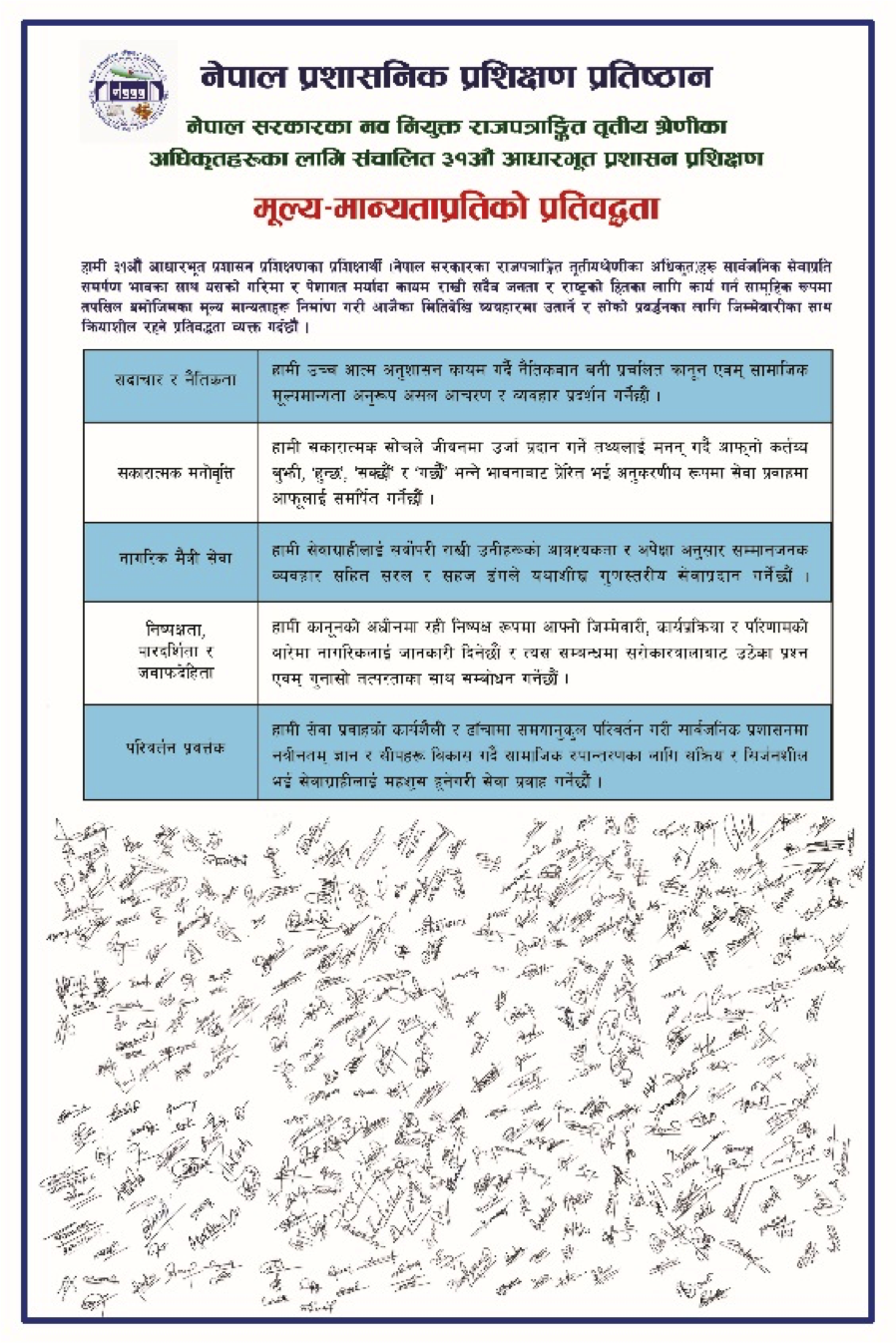NEWS
January 23, 2017

IN BRIEF
Background In January 2017, the Accountability Lab brought together the three winners of the Integrity Idol Nepal competition since 2014 (Gyan Mani Nepal, Pradip Raj Kanel and Dor Bikram Shrees), along with other Integrity Idol finalists (including Bindu Kunwar, Tara Subedi, Bhishma Kumar Bhusal, Krishna Prasad Danchha, Bhuwan Kumari Rai, and Ram Narayan Shah), experts in anti-corruption and governance (including Suryanath Upadhyay the former head of the CIAA, Dr. Tarak Bahadur KC the Deputy Executive Director of Nepal Administrative Staff College, Bharat Bahadur Thapa the Head of Transparency International and Jiwan Prabha Lama the former Secretary of the Nepali Government, […]
SHARE
 Background
Background
In January 2017, the Accountability Lab brought together the three winners of the Integrity Idol Nepal competition since 2014 (Gyan Mani Nepal, Pradip Raj Kanel and Dor Bikram Shrees), along with other Integrity Idol finalists (including Bindu Kunwar, Tara Subedi, Bhishma Kumar Bhusal, Krishna Prasad Danchha, Bhuwan Kumari Rai, and Ram Narayan Shah), experts in anti-corruption and governance (including Suryanath Upadhyay the former head of the CIAA, Dr. Tarak Bahadur KC the Deputy Executive Director of Nepal Administrative Staff College, Bharat Bahadur Thapa the Head of Transparency International and Jiwan Prabha Lama the former Secretary of the Nepali Government, and Trilochan Pokharel the Director of Studies at the Nepal Administrative Staff College), and over 150 trainees at the Nepal Staff College (the civil service training school).
Unpacking Integrity
The group discussed the dynamics of integrity in Nepal, the ways in which individuals can resist the pressure to be corrupt, and how a system for accountability can be developed within the civil service. Key points from the discussions included the following:
- Integrity as a Value: The discussion circled back repeatedly to the point that integrity is a personal value- and building integrity in Nepal will require all of us to demonstrate accountability in our daily lives. This requires a fundamental cultural and normative shift. It is not good enough to point fingers at others and expect those in power to behave any differently if we do not act responsibly in our own homes and workplaces.
- Integrity through Delivery: Integrity requires trust, and trust in turn comes through delivery on promises. The Integrity Idols agreed that promising to take an action – however small – and completing that action on behalf of citizens is a critical part of demonstrating integrity. If repeated, this process builds trust, which allows for further action and progress. For a civil servant, this means integrity stems from the way you approach the job beyond just your values with a proactive mindset and a willingness to be creative to overcome unexpected barriers.
- Integrity as Incentives: It is essential to define the relationship between a public servant and public service. That is to say, let’s ask “what are the reasons that any given individual is working in government and how do they reflect that?” It should be a willingness to serve the public, rather than an experiment in vanity or wealth-creation. For those people trying to navigate the system with integrity, it is essential to understand the incentives of those in power for the wrong reasons and find ways to align those incentives with citizen-oriented programs.
- Integrity through Humility: Creating a system of accountability requires understanding context, and this can only come through understanding the role of the public servant as the agent of the people, and truly listening to citizens. We need to make sure we communicate local languages, (Pradip Kanel, for example, translated the citizen charter in Sarlahi District into the Maithali language) understand local history and culture and recognize local needs- and do all of this with a smile. Too often the bureaucracy becomes an exercise in paper-work instead of an exercise in “people-work.”
- Integrity using People-Power: Corruption has become the status quo, but it is quickly rejected by citizens when they have the opportunity. Gyan Mani Nepal and Dor Bikram Shrees, through their education reforms, explained how quickly people can move from participating in a corrupt system to resisting it- once they see the changes it can bring to their daily lives. Pradip Raj Kanel explained how he has now implemented a “touch to find” system whereby any information related to citizens in the District Administration Office can be tracked within 5 minutes. This has allowed DAO staff to understand and respond to citizens far more effectively than previously.
- Integrity Begins with Education: Teaching integrity is essential from a very young-age – as this is where learned behaviors develop, whether that means turning up on time to school or making sure litter is put in rubbish bins. We can read about integrity, but children learn more from observation – so all of us have to make sure we are setting an example for the next generation.
- Integrity through Role-Models: The Integrity Idols emphasized repeatedly that it is possible to live a happy and secure life as an honest civil servant – there is no need to be corrupt. There is a perception within Nepal that wealth somehow correlates with success, at any cost. It is critical that civil servants understand from the outset that in fact, it is dignity and integrity that correlate with success. The group estimated that only 30% or less of the people in government are honest – but it is this group that we should respect, support and continue to celebrate.

Outcomes
The more than 400 trainees within the Staff College under Basic Administrative Training broke into groups of 25 and discussed values-based leadership for several hours. Through this process they developed and have committed to a values document to guide their work, which included the values of: integrity, positive attitudes, friendly public service delivery, impartiality, transparency and accountability, and a change mindset. This document will guide them in the next few months as they are sent to districts all over the country to take up their posts.
The Accountability Lab team will hold a 2nd Integrity Summit with the Integrity Idols and experts in anticorruption and governance in the summer of 2017 (details forthcoming). The idea, over time, is to build a powerful network of reformers within the civil service, who can collectively work to build integrity within the system, improving lives for Nepalis all over the country.
